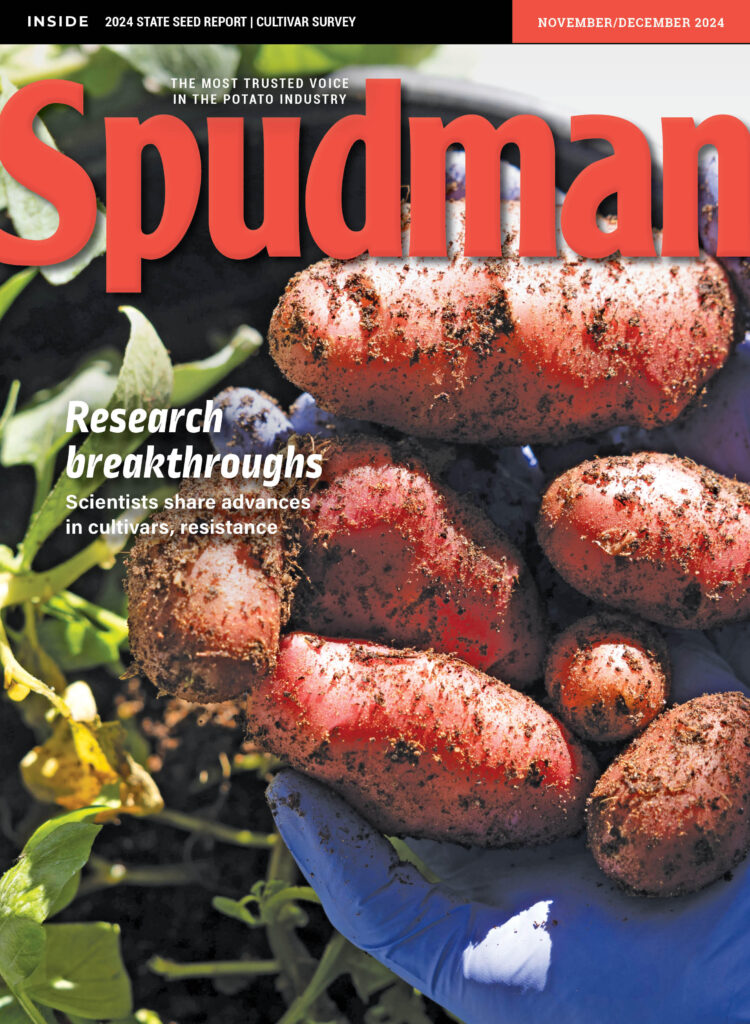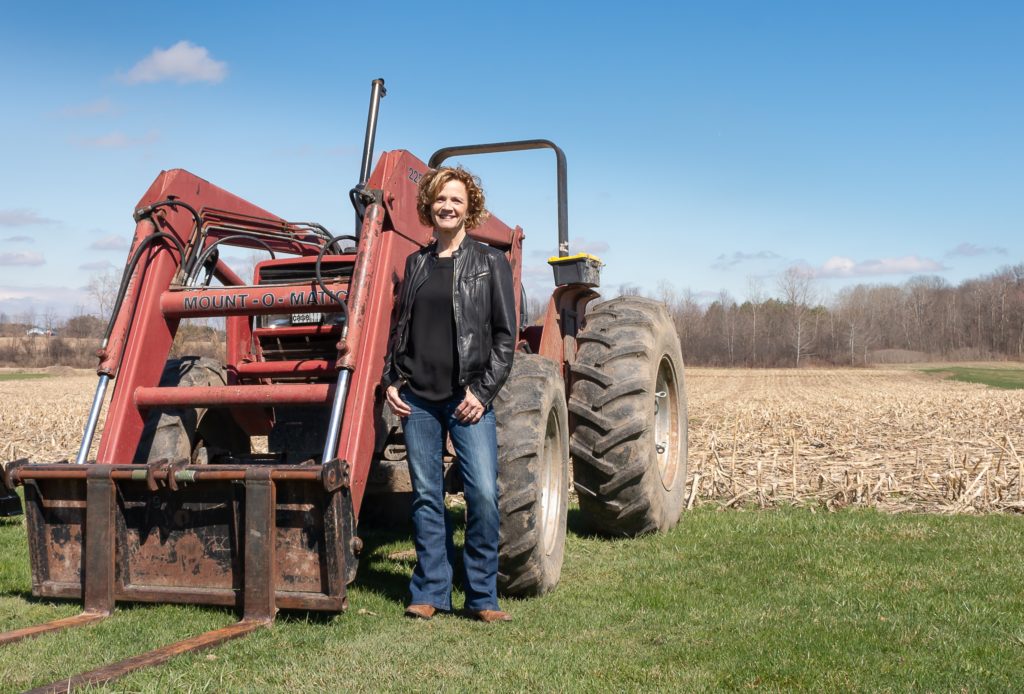
Melanie Wickham wins 2018 Spudwoman of the Year
When Melanie Wickham steps away from Empire Potato Growers she will have served as the group’s leader for 33 years. She’ll also have dozens of successes and hard-won victories to look back upon.
Those include a trade show that has more than doubled in size, a vibrant research fund to help growers and a trailer. Yes, a trailer. A trailer that houses a USDA Agricultural Research Service lab and represents a goal that Wickham has been working toward for over a decade.
“I vowed I would not leave till I got this one,” she said.
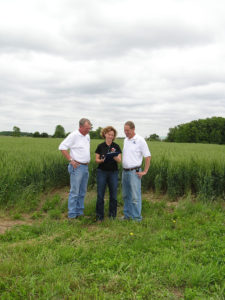
That rundown trailer, described as an army surplus trailer from World War II, will soon be upgraded thanks to the work of Wickham and countless others. It represents more than you might think if you just glance at it while driving past. It is actually a powerful weapon against one of New York potato growers’ most persistent foes, the golden nematode.
Walter DeJong, associate professor at Cornell University’s School of Integrative Plant Science, said without proper facilities, plant breeders like himself would be without vital tools in the fight against the pest.
“From a standpoint of developing resistant varieties to keep it contained, if there’s no place that can inoculate potatoes to tell if they’re resistant, I can’t develop golden nematode resistant varieties,” he said. “It comes down to that our primary control mechanism in New York falls apart if we can’t test for resistance.”
New York growers have been fighting the golden nematode for decades and there have been recent victories. Earlier in 2018, the USDA’s Animal and Plant Health Inspection Service (APHIS) removed 193,782 acres from the golden nematode (GN) regulated area in five New York counties.
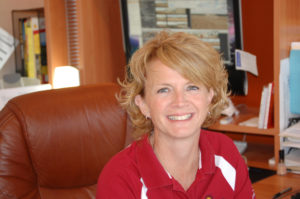
decades.
Since 2010, APHIS, working closely with the New York State Department of Agriculture and Markets, has removed 1,102,131 acres from the GN regulated area in the state. That leaves 186,534 acres still regulated in eight counties. Of that, APHIS considers 5,945 acres to be infested with GN. This acreage has an active control and mitigation program in place to prevent its spread.
DeJong said fighting the nematode, while important to New York growers, benefits potato growers nationwide.
“Ultimately, getting the funding for the quarantine facility ensures we can continue to develop golden nematode resistant varieties in New York, which will help to ensure GN doesn’t spread through New York and, even worse, it doesn’t spread elsewhere,” he said.
The reason Wickham was able to win that long fight, and the reason she’s been able to guide the Empire Potato Growers to success is that she would never say that “she” secured the funding for the trailer. She always points to the “we,” to the growers, researchers and legislators who all played a part in pushing for funding.
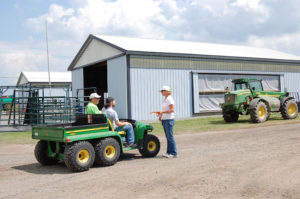
“I think it’s all about relationships,” she said. “It’s all about getting to know people and learning what they need from you and what you need from them and how you can make a difference, make an impact.”
Wickham took the job as executive director of Empire Potato Growers in 1986. One of her main responsibilities has been managing and growing the yearly trade show. Without a checkoff, the organization relies on the show as its primary source of funding. When she started, Empire Farm Days featured 264 booths. Now that number is over 600.
Her collaborative approach also helped when national policy changes affected demand for potatoes.
“Melanie has the valuable attributes of being eager to take on very tough battles on behalf of her growers and the potato industry and the toughness and perseverance to win those battles,” said John Keeling, CEO of the National Potato Council. “Her hard work on the inclusion of potatoes in school lunches and WIC was critical in reversing the ill-conceived policies that reduced access to the nutrition provided by potatoes.”
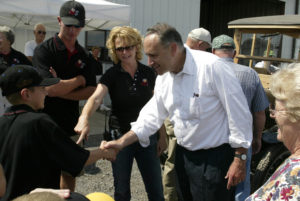
During the Obama administration changes were made to nutrition guidelines, which cut the amount of “starchy vegetables” that could be included in school lunch programs.
Ralph Child, president of Empire State Potato Growers has, worked with Wickham for years and visited representatives of urban areas with her to make the case for potatoes’ nutritional value.
He said Wickham is just as comfortable talking to growers in rural areas as she is talking to legislators in New York City. In one case, he said, a representative of an urban area was clearly not listening to Wickham’s argument for potatoes, but one of his staff members was listening in from another room.
That staff member was so moved by the points that Wickham made, that she came to her boss and helped convince him.

“She can go in those offices and be very persuasive,” Child said.
DeJong echoed that sentiment.
“She’s really, for a bigger perspective, the coordinator for the entire New York potato industry,” he said.
Wickam’s farm roots run deep. She tended to livestock and participated in 4-H while growing up and her parents instilled the value of farming early.
“It was always the noblest of professions, according to my father, and I always wanted to be a part of that,” she said.
Now with her own family — she has four grown children and three grandchildren — she’s continuing that tradition. When she leaves Empire Potato Growers she’ll still work on her pumpkin farm in New York’s Finger Lakes region.
Her daughter Samantha and her husband Drew both are vital parts of the Empire Farm Days team and the family talent at holding events will continue as well. The Wickhams own an event management company and even built a space on the farm to hold weddings and other gatherings.
Aside from her own projects, Wickham is still going to stay active in New York agriculture and she’s excited for the industry’s future.
For example, she was at a meeting in December 2017 filled with a younger generation of potato growers who began asking questions on how to support research efforts at Cornell and how to get funding for the industry as a whole. As a result, in mid-March 2018, she took 10 young growers to meet with Cornell’s dean and her staff as well as the heads of the university’s research programs and Extension leaders.
“They sat there and we spent an hour one-on-one with some of the leaders in our industry, on the cutting edge, and I just walked out of that meeting shaking my head saying ‘I can’t believe I’m leaving right now,’ it’s so exciting.”
Wickham’s career has been marked by gathering coalitions of people to achieve ambitious goals. She jokes that if she knew how tough the job would be, her younger self may have been a little less confident. Regardless of the challenges she and the growers she represents have faced, she has always found a way to succeed.
“Stay focused on what challenges you and what brings you joy,” she said. “Just always punch above your weight class, that’s all I can say, and do what you want, not what someone tells you you’re capable of doing.”







